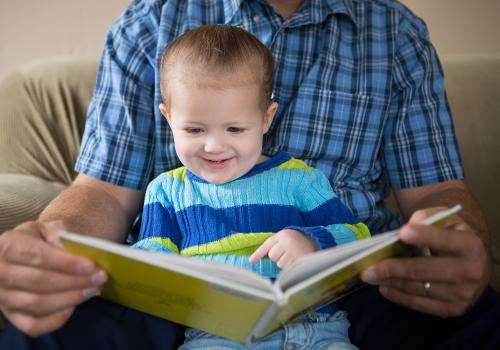Fostering independence and life skills: For children with developmental disabilities, parenting style matters

(Medical Xpress)—Positive parenting can be particularly effective in helping young children with developmental disabilities become more independent and cooperative, a Brigham Young University study found.
Yet, while thousands of research articles have trumpeted the benefits of positive parenting for typically developing children, comparatively few studies have examined positive parenting for children with developmental challenges.
Tina Dyches and Tim Smith, both members of the Department of Counseling Psychology and Special Education faculty in Brigham Young University's David O. McKay School of Education, and their team found just 14 empirical studies that looked at parenting of children with developmental disabilities such as Down syndrome, intellectual disabilities and autism.
Despite the variety of studies and subjects, the results of their analysis clearly demonstrated an overall beneficial effect of positive parenting on the functional outcomes of young children with developmental disabilities. And the magnitude of the results did not differ across disability type or the age of the child.
The positively parented children in the studies exhibited higher levels of independence, language skills, emotional expression and social interaction with adults and peers. They also demonstrated improved temperament.
"The development of a child with a disability depends on his or her ability to engage socially, so parenting takes on a different importance," said Smith. "The child requires added time, education, coping skills and family support."
But, despite the sacrifices, for parents who engage in positive parenting practices, the pay-off can be significant.
"In households where positive parenting is applied, the symptoms and severity of the child's disability are more likely to decrease over time," said Smith. "Research has consistently shown that the earlier and more consistently positive parenting is provided, the greater the child's development."
They published their study in the November-December 2012 issue of Research in Developmental Disabilities, available here.
Parenting styles can be broken down into three types. A "permissive" parenting style is non-punitive, accepting and non-demanding. On the opposite end of the spectrum is an "authoritarian" parenting style where parents attempt to influence and control the child in order to maintain obedience and respect for authority.
In the middle is an "authoritative" or "positive" parenting style, one that is rational and respects the child's self-will balanced with disciplined conformity. This parenting style results in more positive child outcomes than the other two.
"Signs of positive parenting include making frequent eye contact, using positive affirmation rather than criticism, demonstrating understanding and responding immediately," said Smith, who noted that such generic skills should then be supplemented with practices and activities specific to the child's needs and personality.
The idea of positive parenting may seem like a "no brainer," said Dyches, but, for a parent faced with the day-to-day needs of a child with developmental challenges, it might be difficult to implement.
"When you think of parenting a child with a developmental disability, it might be more intuitive to be authoritarian and assume that the child can't figure out things alone," she said. "On the other hand, with a child who has autism, it may seem easier and less contentious to be more permissive with the child and thereby avoid conflict."
"But there needs to be a balance. A child with a disability should not be subject to different rules in a family, nor be the center of a family," she said.
Added Smith, "We need to ask ourselves, 'Does the parenting appropriately facilitate the child's adaptation, or does it do for them what the child could and should do for himself or herself?' The objective is to better facilitate the child's inclusion in society," he said.
Smith believes that, to best promote positive parenting, parents should begin their education before the child is born, if possible.
"Physicians and counselors should educate parents on the disability and what they can do to facilitate the child's development," he said. "Parents should also be given referrals to educational programs, governmental and private non-profit agencies and social networks available to them."
The necessity of early intervention is particularly crucial for children with developmental disabilities in single-parent homes, because of often-limited resources, especially parental time, he said.
Stress on the parent is also a concern, as previous research has shown that parents of children with disabilities are required to engage in more time-consuming tasks.
"But that same parent can also experience 'eustress' or positive stress from being more actively engaged in the child's life," said Smith. "There are so many rich opportunities that society overlooks that are afforded to parents of a child with a disability."
Additional research is needed to examine specific parenting behaviors that are elicited by varying disabilities, said Dyches and Smith.
Research is also warranted regarding parenting styles in various family compositions:
- Are positive parenting behaviors more or less prevalent in homes with children with and without disabilities, or in homes with only one child (or multiple children) with disabilities?
- Do parents differentiate their parenting styles when interacting with their children with, compared to their children without disabilities?
- What types of parenting support programs/interventions are most helpful for parents with children with disabilities?














